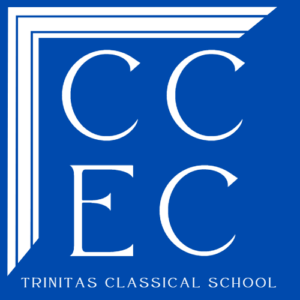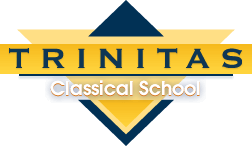 In this Classical Christian Education Corner, we continue our discussion of our new tagline, “preparing students for lives of faith, reason, and virtue” with a look at “reason”. It seems obvious that a school would have the cultivation of reason as a primary goal. Isn’t that what schools are for? This goal may not be as widespread as one would think, or hope, however. Certainly, some sort of knowledge and skills are objectives for any learning environment, but classical Christian schools operate with a more robust concept of human reason—one that is informed by the view of human nature mentioned in our previous post about faith. In that discussion, we said that one principle of a classical Christian education is: “there is more to this world than what is seen” — that the material world is not all there is; and, human beings, having been created in the image and likeness of God, are not mere material beings. What implications does this have for education?
In this Classical Christian Education Corner, we continue our discussion of our new tagline, “preparing students for lives of faith, reason, and virtue” with a look at “reason”. It seems obvious that a school would have the cultivation of reason as a primary goal. Isn’t that what schools are for? This goal may not be as widespread as one would think, or hope, however. Certainly, some sort of knowledge and skills are objectives for any learning environment, but classical Christian schools operate with a more robust concept of human reason—one that is informed by the view of human nature mentioned in our previous post about faith. In that discussion, we said that one principle of a classical Christian education is: “there is more to this world than what is seen” — that the material world is not all there is; and, human beings, having been created in the image and likeness of God, are not mere material beings. What implications does this have for education?
First, education is not merely instrumental. It should not be designed primarily to help students meet their material needs and desires. The cultivation of reason, while certainly of instrumental value, is a good in itself. Subjects like grammar, Latin, Greek, and classic literature, and methods like memorization, critical thinking, debate, and rhetoric, can help students achieve many things, but they also enable students to develop well their God-given capacity for and delight in reason. A comparison to the body may help to illustrate. It’s good to exercise the body so that we can do the various things we need to, but it’s also good to cultivate physical capacities simply because the body is God’s gift and he designed us to delight in its activity. Developing our minds and bodies is part of what God intended for human flourishing.
Second, according to a classical Christian view, reason should conform to reality and be informed by faith. Students are taught to seek objective truth, goodness, and beauty. Trinitas is not in the business of creating relativists or Sophists, intellectual mercenaries who use their skills in service of whatever purpose they choose or are paid for. In cultivating reason, students learn to renew their minds as we are instructed in Romans 12:2, “Do not conform to the pattern of this world, but be transformed by the renewing of your mind. Then you will be able to test and approve what God’s will is—his good, pleasing and perfect will.” Further, students discover that there are mysteries in this world and beyond it that human reason alone cannot discern. Those of you participating in the Dante reading group will see this very clearly in The Divine Comedy—Virgil, the embodiment of human reason and the best of classical wisdom, cannot complete the journey, eventually Dante will need another guide.
Third, we believe that content matters. Simply put, better content is better for developing minds and character. Philippians 4:8 continues to guide us in curricular, extra-curricular, and cultural matters: “Finally, brothers and sisters, whatever is true, whatever is noble, whatever is right, whatever is pure, whatever is lovely, whatever is admirable—if anything is excellent or praiseworthy—think about such things.” The classical Christian tradition is overflowing with examples of truth, goodness, and beauty. With so many such things to study, why would we choose things of lower quality?
Finally, intellectual habits matter. There has been a lot of talk recently about the concepts of “grit” and “growth vs. fixed mindsets”. The much older, classical concepts are “perseverance” and “self-control”, and an important related concept is “humility.” The challenging subjects, content, and methods of a classical Christian education cultivate these intellectual habits well. All around us, there seems to be an increasing timidity–people are afraid of being wrong, or worse, appearing to be wrong. As a response, many attempt to restructure classrooms, and much of the world, as well as they can, to avoid such situations. Classical schools are not engaged in this restructuring.
While there is some danger in a classical education leading to pride, humility is at the foundation of all learning. According to tradition, Socrates’ (rather proud) claim to wisdom lay in his knowing that he “knows nothing,” or at least knowing when he doesn’t know. The so-called Socratic method of question and answer is not, contrary to how it is often used, students-teaching-students by expression of everyone’s opinions resembling exchanges on social media. Rather, it is a teacher-led exercise designed to guide students to truth. Essential components of that process are examining underlying assumptions, avoiding confirmation bias and emotional appeals over rational argument, and exposing error (the Greek term for the Socratic process is “elenchus”). Participants in such discussions should seek to avoid “straw men” and to formulate the strongest answers on both sides. As it says in Proverbs, “Iron sharpens iron.” Of course, in our K-8 school, this process is done more gently and with a greater spirit of cooperation than it was with Socrates and his antagonistic interlocutors.
The point, however, is that engaging with lovely ideas and great minds on hard subjects provides opportunities for struggle and even failure. Students learn to grow in such environments. One mother once suggested another tagline for us: “Come to Trinitas; your child can fail.” She saw this as a good thing. Recent psychological research suggests it is good too–so long as one treats it as an opportunity for perseverance, self-control, and growth. Stay calm and ask, “What went wrong? What could you do next time? What have you learned?” With the intellectual virtues of humility, perseverance, and self-control, students develop their reasoning far better than if they exist in an easy intellectual world, insulated from challenge.
With this robust notion of human reason, it should be clear that we would not want it said of our graduates merely that they are “smart”. It is far more important to us that they be faithful, humble, curious, persistent, self-controlled, selfless, and grateful—all virtues of intellect as well as character. So, we turn next time to our third goal—the life of virtue.
© ALP
